
Fundamentalists Inside The Catholic Church
HOW OLD IS THE EARTH?
Since 1988, the book Catholicism and Fundamentalism by Karl Keating has helped prevent Catholics from being lured out of the Church by Fundamentalists. Where Fundamentalists attack the Church from outside, that book provides important and useful service.
But what if there are Fundamentalists inside the Church? How is the Church to respond to such a situation?
I submit that Fundamentalism is now beginning to infect the thinking of certain Catholics who are loyal members of the Church. The clearest symptom of infection is the belief that the Earth is young, no more than a few thousand years old. This calls for a change of plan from what has worked so far if Catholics are to be defended against Fundamentalism.
Fundamentalists trace their roots to a series of books called The Fundamentals, published by certain Protestants between 1909 and 1915. These books contained (among other topics) accounts of “heresies” (including Catholicism) and “critiques of scientific theories.” To be sure, no one should object to criticisms of scientific work as long as the criticisms are based on sound reasoning. But the critiques that are associated with Fundamentalism at times involve what is in essence a rejection of rational thinking.
Three events indicate to me that American Catholics are now being exposed to Fundamentalist ideas from within the Church.
First, in the process of home-schooling some of our children about five years ago, my wife and I encountered a serious dilemma in connection with certain science textbooks. We did not want our children to be swept along by the erroneous ideas about Darwinian evolution that permeate much of American culture. We therefore selected biology textbooks that reject Darwin’s ideas about evolution. In this regard, the textbooks met our needs admirably. However, we were startled to find that the textbooks also contained the following claim: The Earth is only a few thousand years old. One textbook was Protestant, the other Catholic.
Second, in 1999 one of the leading American publishers of orthodox Catholic books released a book entitled Creation Rediscovered by G.J. Keane. This book contains not only a well-written criticism of Darwinian evolution, but also an extended attack (60 pages long) on the results of modern astrophysics concerning the age of the Universe. The book suggests that astrophysicists have misinterpreted the evidence because of their belief in evolution. The book states that the evidence actually points to an Earth and a Universe no more than a few thousand years old.
Third, in 2001 a meeting that advertised itself as the “First International Catholic Family Conference on Creation” was held in Manassas, Virginia. In the first talk at the meeting (entitled “The Catholic Doctrine on Creation”), the speaker argued for a literal interpretation of the six days of creation, implying that the Earth is young. The written version of this talk includes the claim that “contrary to modern theory, the Earth is the center point of the Universe.” In another talk at the meeting, a speaker discussed 15 points of evidence from physical science which (he concluded) prove that the Earth is only a few thousand years old. (These talks are available on tape.) However, a critical examination of the 15 points shows that in each case the physical processes at work by no means force one to the young-Earth conclusion.
You May Also Enjoy
We need to protect people from the worldview that put Ota Benga in a cage, forcibly sterilized Carrie Buck, and shut the door to Jewish refugees in the 1930s.
Over the past century and a half the bold little doctrine of evolution has taken center stage away from the glory that is revelation and the grandeur that is spirit.
Prum's study advances the claim that much extraordinary avian morphology and behavior is best explained as a factor of female desire and mate selection.

